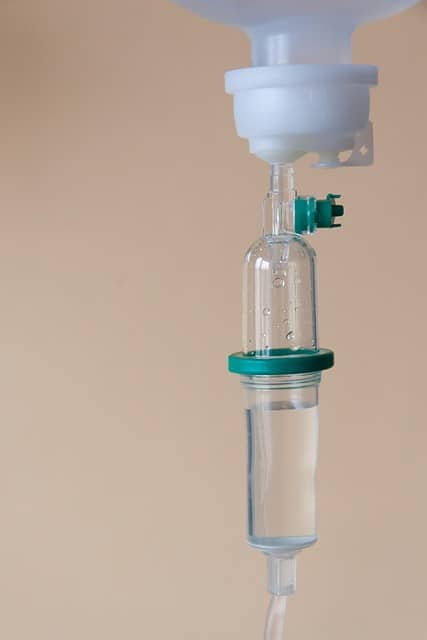It’s 10:28 a.m. My appointment is for 10:30. My husband pulls up to the loading zone, and I don my mask and gather my bags. I hop out, say, ‘I love you,’ and head up the stairs. I go through the lobby to the elevator enclave. There is often a line as the four elevators are in various stages of delivering patients to the eight floors.
The chemotherapy infusion center is on the eighth floor. As I wait for an elevator to ride, I pop a raspberry hard candy into my mouth to help alleviate the anticipatory nausea that is extra strong today.
When I get to the top and exit, I see the signs: Cancer Center/Infusion Clinic (pointing left); Cardiac Care Center (pointing right). I sometimes fantasize about going right. That it would be better to go sit in a room to see a doctor and get tablets to help a chronic condition. No hours spent in a chair with a tube attached to my chest that is pumping in chemicals that are toxic to not only the cancer but the rest of me as well. Is a heart condition easier? At least some of the patients hardly seem ill and are well-managed on medication. That sounds good to me. I know some people with severe conditions are not so great. It’s also probably scary to think you could just drop dead at any moment. No chance for long goodbyes. Cancer often gives its patients that little perk. You know when you start declining fast that goodbyes are in order.
Today I read the signs. I imagine myself going to the right and sitting in the waiting area to be called in to see the doctor. When I’m in the little room and she comes in, she tells me the medication is controlling my condition, and everything looks good. I say thank you and leave. Off to enjoy my day, maybe have some lunch in the city before heading home.
Instead, I turn left, as always. A part of me feels some kind of misplaced pride as I turn left, as if I’m saying to the other passengers who went right, ‘Yeah, that’s right. I’m off to do the hard stuff. I bet you didn’t think I was so tough when I was standing so politely in the elevator asking you what floor and pushing the button.’
I go to the check-in desk and get my wristband. The medical assistant calls my name and does a quick forehead temperature check. He leads me through the door and down the hall to the scale. I never like being weighed with my clothes and shoes on. Then we go past the chairs and more chairs, so many already with patients hooked up to drips. Some chairs sit ready for their next guest. I hope mine will be tucked away. Sometimes I get the private room. It’s luck of the draw.
Today my seat has two pillows instead of one. I’m not sure what to do with the extra. I’m in a small room off the hall, which I prefer, but there is another patient in one of the three chairs. We are offset facing each other, but pretend the other doesn’t exist, to give the other one their anonymity in their pain. I see he has an arm line. He has his head in his hands. I hope he’s not feeling dizzy or sick. It’s hard enough here without having a reaction.
The nurse is one of several I get rotated through. They are all nice with good bedside manners. Supportive but not overbearing. They all follow the same ritual of preparing the sterile items to insert into me. I watch the ritual, entranced, observing the small nuances unique to each one. Once I’m attached, the series of bags begins. Now I get myself ‘comfortable’ by reclining the chair so my legs are up. I request a blanket. Today I’m offered a heating pad, too, which I accept as I feel a chill. Now I write in my journal. I may read, do a New York Times puzzle, or Duolingo on my phone. I usually fall asleep due to the medications. It’s nearly noon. I’ll be here until about 2:30.
The last bag of chemo is attached to me. I will wear it home. It will run for the next two days. It’s kept in a little cross-body pouch as though I’m off on holiday.
I head back, down the elevator, and through the lobby to the loading zone where my husband will pick me up to begin the journey home. No matter how I try, I cannot stay awake for the journey. After two days, my husband will do the removal of the bag at home. He had a crash course from a nurse and has taken on this caretaker task adeptly. Once that last bag is removed, I’ll spend the next eleven days trying to recover from the ill effects, so I can do this again. For the rest of my life.
***
***
The ManifestStation publishes content on various social media platforms many have sworn off. We do so for one reason: our understanding of the power of words. Our content is about what it means to be human, to be flawed, to be empathetic. In refusing to silence our writers on any platform, we also refuse to give in to those who would create an echo chamber of division, derision, and hate. Continue to follow us where you feel most comfortable, and we will continue to put the writing we believe in into the world.
***
Our friends at Corporeal Writing are reinventing the writing workshop one body at a time.
Check out their current online labs, and tell them we sent you!
***
We are looking for readers with an hour or so a week to read non-fiction submissions.
Interested? Let us know!
***
Inaction is not an option,
Silence is not a response
Check out our Resources and Readings if you agree.



Thank you Lee, I am moved by your writing .
In my mind, I traveled with you. I saw myself standing behind you bearing witness to what has grown familiar to you–this process of what sounds like becoming undone again after returning to yourself. I had access to your inner thoughts: the conflict, the humor, the exhaustion that comes from a certain kind of mundane, even if it’s the kind that keeps you alive. We have a right to tire from the discomfort of certain familiars. Every two weeks you become fluent in a language that Duolingo has no access to. You’ve turned left after all, and that’s a special kind of foreign.